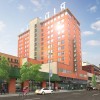Why and Where Micro-Apartments Are Going Up Might Surprise You
New York, San Francisco, Vancouver and, to a lesser extent, Seattle, DC, Boston and LA are logical places for micro-housing. These cities are very or fairly dense, they have high property values in many spots and have infrastructures that support micro-housing–i.e. decent public transportation systems, strong economies, walkable neighborhoods, etc (yes, LA might be a stretch). But micro-housing is no longer limited to high-density cities with extreme property values. All over the country (and world), micro-apartment developments are springing up, a phenomenon, we believe, is happening for several reasons:
- People want to be in the middle of things. Even though downtown Des Moines, Iowa might not be lower Manhattan, more Des Moinesians, particularly Millennial Des Moinesians who are more likely to value experiences over stuff, are wanting to live in the city’s liveliest area (yes, there are micro-apartments going up in Des Moines). Those lively areas tend to be more expensive. Micro-housing gets people into desirable parts of town at a reasonable price-point.
- Cars are taking a backseat. Similar to point #1, people are becoming more open to life without car ownership. If you live near amenities, your work and have access to transit options (car-shares, bike lanes, public transit), why tether yourself to a few thousand pounds of money-sucking, carbon-spewing steel? Accordingly, many municipalities are warming to the idea of housing without (or with limited) parking allowances, which often stand as a huge barrier to building high density housing like micro-apartments.
- People don’t need/want big places as much as they used to. People (Millennials in particular) are delaying or not getting married like they did in years past. The dream of the big place in the burbs is dying. People nowadays are just as likely to want a clean home near all the action with a good wifi connection.
- Micros makes inexpensive housing less expensive. This might be the biggest reason. Let’s say a city’s average one-bedroom apartment costs $800 and a comparable micro-apartment costs $500. For a renter not making much money and who only needs basic accommodations, that extra $300 is a big plus.
- Micros can be good for developers. Let’s say that $800 apartment is 1000 sq ft and the $500 one is 350 sq ft. All things being equal (construction costs, finishes, etc), the developer will make roughly 56% more on a per sq ft basis on the micro. It’s important to note that all things are not equal. Because the most expensive parts of construction–namely bathrooms and kitchens–are the same for micro-units as they are for conventional ones, construction costs can be significantly higher for micros. Add in transforming furniture and other built-ins and the math gets worse from a developer’s perspective. Nonetheless, the higher dollar per sq ft, even factoring above considerations, can make micros an attractive investment.
For these reasons and more, many cities that don’t have housing shortages or high density profile of aforementioned cities are jumping on the micro-apartment bandwagon (go here if you don’t know what micro-apartment means).
Here are some North American cities that have buildings touted as micro-apartments that are already built, in process or that are being seriously considered:
- Chicago, IL. Despite being rocked by year-over-year real estate value declines, FLATS Chicago has been rehabbing old SRO buildings, making them into hip, affordable micro-apartments (get a free fixie when you sign a lease…seriously).
- Philadelphia, PA. A building dubbed The Avenir will be offering luxury studios starting at 314 sq ft later this year.
- Providence, RI. We’ve reported and expressed our zeal about the Arcade Providence–the mall turned micro-apartment complex. While not the most unlikely spot to have micros, Providence is another place with a bounty of available, low-cost housing. The Arcade’s success (100% occupied) seems to be a function of lifestyle choice, not a dearth of alternatives.
- Des Moines, IA. This city, with 1/10 the density of NYC, has its own micro-apartment building called The Flemming, with affordable studios in the low 400 sq ft range. The building is 100% leased.
- Columbus, OH. Who’d of thunk it. A company called Connect Realty is making a building with 56-58 units starting at 450 sq ft.
- Nashville, TN. Developer Giarratana Nashville LLC is making a 146 unit, centrally-located building with all units under 500 sq ft.
- Orlando, FL. This central Floridian city, like Houston or Atlanta, is often held up as an exemplar of car-dependent living. Which is why it’s pretty awesome a German developer is trying to build a micro-apartment building with units ranging from 260 to 447 sq ft and a number of transforming elements.
- Denver, CO. Developers Realty Capital Group and the Nichols Partnership are turning a funky old hotel near Mile High Stadium into residential rental building called Turntable Studios with 170 micro-apartments, some as small as 330 sq ft (pictured at top).
- Spokane, WA. Like Turntable Studios,The Ridpath Club Apartments is a former hotel-turned-micro-apartment building.
- Portland, OR. Though the city is known for its tiny houses, it’s not known as a particularly dense or expensive city to live in. Yet the city features a number of micro options including the hyper-patriotically named, multi-story Freedom Center as well as a number of smaller, aPodment-style buildings from such developers as Footprint Investments.
- Edmonton, AB. You wouldn’t think that a city ⅓ as dense as Des Moines, IA would want micros, but that’s what Beljan Development is proposing to do. They are making a 40 unit building with 350 sq ft micro-apartments. There will be no designated parking spaces but it will have a large bike locker.
- Surrey, BC. While Vancouver is notorious for its high property values, its sister city Surrey is not, which is why the Balance micro-suite building is on this list.
- Nova Scotia. Right? Micro Boutique Living is offering clean, modern, affordable little digs in Wolfville, Antigonish and St Johns (all but the latter city this author had never heard of prior to writing this post).
There are a few cities not mentioned, notably Jersey City and Hoboken, which this author considers satellite cities of New York. Likewise, there are some buildings whose actual fate is TBD; proposals do not a building make.
If you know of other buildings and developments not mentioned here, particularly in cities that don’t “need” micro-housing, please share in our comments section.









